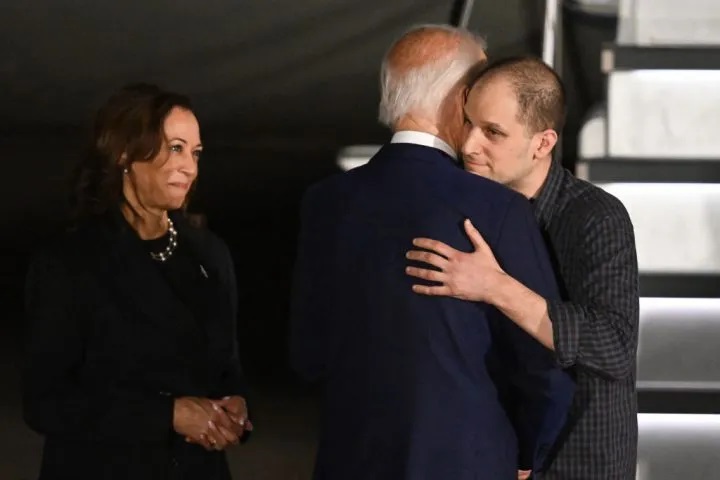I can well understand that joy and relief experienced by the supporters and families of the hostages released yesterday by Vladimir Putin. For I myself owe my life to a Cold War spy swap.
In October 1969, the British government exchanged Peter and Helen Kroger, two senior Soviet career spies nabbed for running a very real espionage ring, for Gerald Brooke, a British student who had served five years in a Russian jail for “anti-Soviet agitation.” The exchange was so unequal that Brezhnev’s Politburo agreed to throw in three Soviet citizens who wanted to marry Britons in as a makeweight. One was my mother, Lyudmila Bibikova.
Releasing Navalny would have been too dangerous and too humiliating a move for Putin to stomach
She had met Dr. Mervyn Matthews, a young British academic, at Moscow university six years before and they tried to marry. The KGB blocked the wedding and tried to get my future father to work for them. He refused. In short order the KGB declared him persona non grata, expelled him from the USSR and fired my mother from her librarian job at the Institute of Marxist-Leninism. My parents were finally included in the spy swap thanks to the persistent activism of my father, who pestered visiting Soviet and British foreign office officials for years. During their years of separation they wrote to each other every day m — and my mother wistfully reflected that it seemed as unlikely that they would see each other as visit the moon.
Yesterday’s exchange of four Americans and twelve Russian political prisoners for eight Russian spies is indeed the largest such exchange since the Cold War. But there’s a fundamental difference between the spy swaps of the Soviet era and the exchanges made by the Putin regime. The most glaring one is that every one of the prisoners held by Putin was innocent and was imprisoned either on trumped-up espionage charges or for merely daring to disagree with the Kremlin.
Conversely, the Russians whom the Kremlin have brought home are a collection of murderers and criminals. Most notorious among them is fifty-eight-year-old Vadim Krasikov, who was convicted of assassinating a Chechen dissident in a Berlin park in 2019 and whom German authorities say is a former colonel in Russia’s federal security service, or FSB. In previous exchanges, a US Marine veteran was swapped for convicted Russian drug smuggler Konstantin Yaroshenko in April 2022, and later that year American basketball star Brittney Griner was exchanged for Russian global arms trafficker Viktor Bout, known as the “merchant of death.”
A few of the Russians exchanged today are old-school spies — combatants, in other words — such as Pavel Rubtsov, a professional “illegal” who spied for the GRU for years under journalistic cover as Pablo Gonzales. It’s an important matter of principle for the FSB, just as with the KGB, not to abandon its own. But while that impulse may appear honorable, their methods certainly are not. Not one of the Americans or Russians released had any known connection to espionage at all. All were innocent victims of Putin’s regime. And the Americans were simply hostages, cynically arrested and collected into an “exchange fund” in order to trade them for the FSB’s hitmen, cyber criminals and spies.
Most tragically of all, jailed Russian opposition leader Alexei Navalny should have headed the list of the released. Instead, Navalny was almost certainly murdered by the Putin regime earlier this year precisely to prevent that from happening. According to reporting by Navalny’s allies, he was eliminated precisely in order to clear the way for lower-profile hostages to take his place. Releasing Navalny would have been too dangerous and too humiliating a move for Putin to stomach.
For the families and supporters of the hostages, their release is a moment of triumph and joy. But it also, like all negotiations with hostage-takers and other terrorists, brings serious moral hazard. The three sets of exchanges between 2022 and today have set a dangerous precedent. Every future FSB assassin, covert agent and hacker arrested in the West will invite a tit-for-tat arrest of an innocent Westerner in Russia. That’s the reason that Americans and Britons are vehemently and officially discouraged from travel to Russia.
For all its dangers, there may be another reason to celebrate the swap. Talk of a Ukraine ceasefire has intensified over recent weeks, with President Volodimir Zelensky signaling for the first time that he is willing to step back from his insistence on restoring his country’s pre-war borders. The Kremlin has also signaled its willingness to bring the conflict to an end — albeit so far on ridiculously unrealistic terms which includes demands for Kyiv to cede even more territory. Back-channel talks about talks involving both US and Chinese proxies have been reportedly ongoing for months. The successful end to the hostage negotiations — which involved nine countries and months of closed-door horse-trading — could bode well for a more substantive deal bringing the active fighting to an end if not, as yet, a lasting peace.
It’s hard to describe yesterday’s exchange as a trust-building exercise between Russia and the West for the simple reason that Putin has shown himself as merely a successful blackmailer. Nonetheless, it’s significant that Putin has released all his most valuable hostages, and the West has also released all their main exchange assets. That removes one major stumbling block from the road to a deal — as well as removing the release of political prisoners as a concession that Putin might have to make further down the road, allowing him to save face in the future.
There’s also historical precedent for prisoner exchanges heralding a thaw in relations. In June 1985, new Soviet leader Mikhail Gorbachev ordered the exchange of twenty-five prisoners jailed in the Soviet bloc for espionage in return for four Soviet spies held in the West. That swap — staged on the iconic Glienicke Bridge between Potsdam and West Berlin — set the scene for groundbreaking arms-controls deals between Gorbachev and Ronald Reagan.
It’s hard, today, to imagine any such era of new detente as long as Putin remains in power. He has lied too frequently for real trust to be realistically rebuilt. Much less can this exchange be seen as a gesture of goodwill on the part of the Russians — not least because they probably murdered the most valuable of their own prisoners rather than see him a free man. Nonetheless, it’s possible that the Kremlin regards this exchange as a kind of proof that they can stick to a deal. And that may signal a turning point in the endgame to Putin’s failed attempt to conquer Ukraine.
This article was originally published on The Spectator’s UK website.


























Leave a Reply